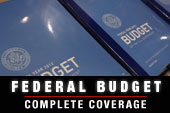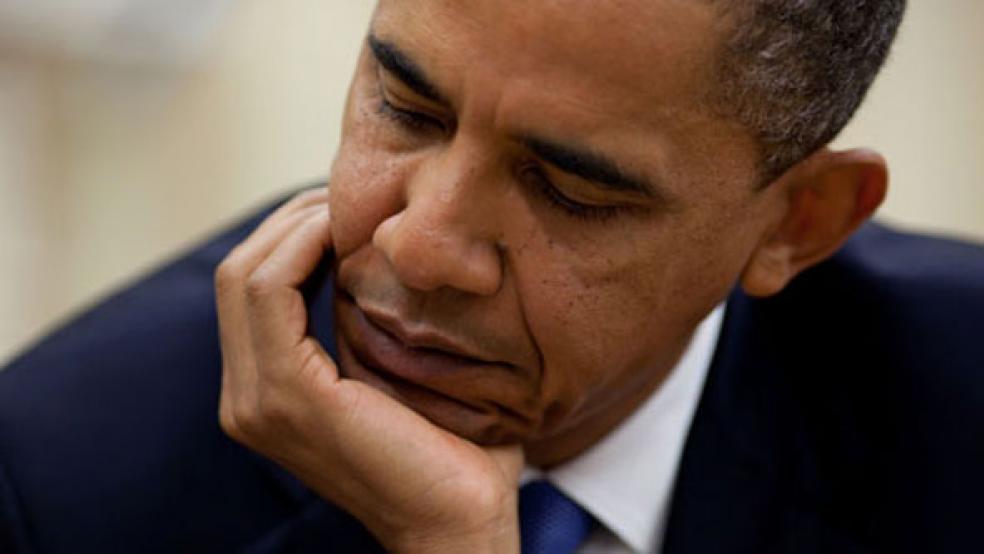At the beginning of the year, the media hailed Barack Obama as the winner of the standoff on the fiscal cliff – and it wasn’t difficult to see why. Obama forced House Republicans to swallow a tax-rate increase for the first time in more than a decade, breaking a vow that had been a bright line with their conservative base. Even though the President had to adjust on the baseline for the marginal tax increase from a $200,000 income level to $400,000, he successfully used the leverage of scheduled increases of tax rates in all brackets to break GOP opposition as the clock ran out.

Not everyone agreed that this was an unqualified success for President Obama and an unmitigated disaster for Republicans. Peter Orszag, once one of Obama’s closest economic advisers and his first Director of the Office of Management and Budget, wondered aloud whether Obama’s victory wouldn’t prove Pyrrhic. “It’s entirely possible,” Orszag told CNBC, “they’re going to win the week and lose the quarter,” thanks to the separation of the tax resolution from other fiscal-cliff issues such as the debt ceiling and the sequester.
As Orszag predicted, Obama won one battle, but may be losing the war. And it has become very apparent that Obama hasn’t even really prepared to fight it.
Republicans, on the other hand, have carefully shaped the political battlefield ever since the beginning of the year. They wisely avoided a head-on battle over the debt ceiling by lifting it for four months, with a commitment to authorizing any additional borrowing past the statutory limit ex post facto. That allowed the House GOP to focus on the true problem of rapidly-escalating national debt, bloated budgets, and massive annual deficits: federal spending.
John Boehner pledged to his caucus that he would no longer follow a crisis model of budgeting, and would instead insist on normal-order budgeting and conference committees to deal with differences between the House and Senate. The demand put enough pressure on Harry Reid and the Senate that new Budget chair Patty Murray pledged to produce a Senate budget resolution this spring – the first in four years.
After having shaped that battlefield, the GOP then changed its position on the next “cliff”: the sequester. The budget mechanism proposed by the White House and approved by both Republicans and Democrats in August 2011 will cut $1.2 trillion in spending over the next ten years, starting immediately on March 1. Republicans in 2012 had rung alarm bells over cuts to defense spending – which was exactly why Obama and his team proposed the automatically applied default cuts in the first place. At the time, they expected that the GOP would abhor cuts to defense so much that the White House would keep its leverage in budget negotiations.
Surprise! After the tax fight concluded, Republicans decided that the sequester, while far from perfect, was at least a step in the right direction. Since it automatically applies – just as those across-the-board tax-rate increases did in the New Year’s Day battle – House Republicans can do nothing and get their spending cuts. And now it’s Obama who finds himself grasping for leverage, and finding none.
The desperation began to show this week. Barack Obama blinked first by announcing that he was requesting another postponement of the automatic cuts in order to produce a “balanced” deficit-reduction package. Congress, Obama said, “should at least pass a smaller package of spending cuts and tax reforms” instead of allowing the sequester to go through. Boehner reminded Obama that the House has twice passed such measures, only to go nowhere in the Democratic-controlled Senate.
The White House also tried taking a page from the (unsuccessful) Republican playbook of 2012 by claiming that American industry would have to lay off workers if the sequestration hit. “There is no reason,” Obama intoned, “that the jobs of thousands of Americans who work in national security or education or clean energy, not to mention the growth of the economy, should be put in jeopardy.”
Obama provided plenty of dire warnings about the damage that his own budget-gimmick proposal may do if it becomes active in less than four weeks. What Obama hasn’t provided is an actual solution for replacing his previous solution. In fact, Obama hasn’t yet provided a budget proposal for FY2014, despite having a statutory requirement to do so by now – making four budget proposals out of Obama’s five opportunities that arrived late. Instead of offering specific proposals for spending cuts to replace the sequester, Obama offered a vague demand for “tax reform” that would increase revenue again.
This deadline has been in place for months. It became clear weeks ago that Republicans would likely allow the sequester to go forward, at least long enough to put pressure on replacement cuts from Democrats, and would be in position to refuse to raise any more revenue. And yet Obama not only sounded like someone shocked out of a reverie, he offered nothing to resolve the standoff – and neither did Harry Reid and Senate Democrats, not even an offer to take up the bill approved by the House in the last session if passed again.
Boehner has triumphed in at least exposing the White House’s fumbling on spending issues – and he wasted no time in driving the point home. “Yesterday the president warned of grave economic consequences if the sequester were to go into effect, but he didn’t announce any specific plans of how he would address it,” he pointed out after Obama’s demand for a delay. “He didn’t bother to outline how he would replace the sequester, which he suggested and insisted upon in August of 2011. He didn’t even tell us when we might see his budget, which is again late, and how he would address the sequester in his budget.”
In short, the President has no plan, and no leverage. With the tax rates and Alternative Minimum Tax fixes now permanent, Obama has no more leverage to force the House into bending to his will. His one gimmick to force Republicans to cave into his demands for higher taxes and more spending just backfired, and Obama has nothing more to offer. After almost four years of budget cliffs and gimmicks, Barack Obama will have to accept that reality and get serious about budget reform on the other side of the ledger.






